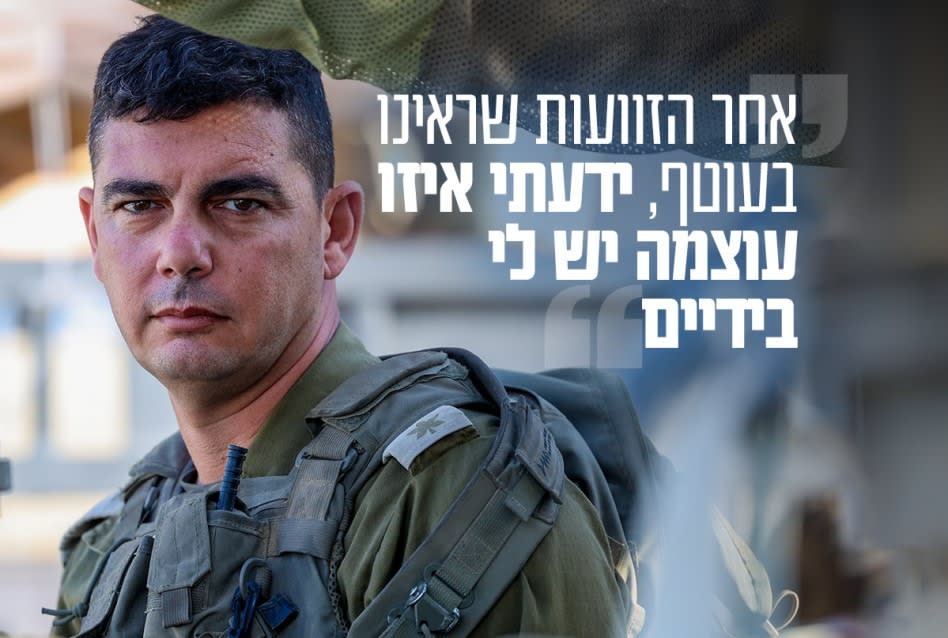‘No alternative but victory’: Colonel says IDF nearly finished in Gaza, Lebanon next
“We are close to a decisive military victory in the Gaza Strip, and we are prepared for a battle in the North. We are already in a multi-front confrontation with changing forces, and at least in the places where I am, the IDF is prepared for a battle in the North,” Colonel Dvir Edri, commander of the 460th Brigade, told Maariv in a recent interview.
“It will not be easy or simple, but in light of the fighting in the South, we have a generation of experienced commanders and soldiers,” he added.
Responding to the comment that the soldiers were also tired and worn out, Edri stated “When the task is to return over a hundred thousand residents to their homes, then I trust them to find the strength to do it in the best way.”
Most of Israel’s wars to date have been short, unlike a prolonged war of attrition
“A short war is a relative matter,” Edri said. “No war in the past has set itself such a clear goal which takes a long time to achieve. It is impossible to destroy Hamas in a short time. Perhaps we could have done things faster, or we could have done different things. Still, already at the start of the war, they spoke of a year of fighting with varying levels of intensity because everyone understood that defeating Hamas would take time.”

Will the IDF be able to achieve its goals?
“I want to believe so,” Edri stated. “Any military expert who can identify the achievements on the ground will say that we are close to victory. We have achieved definite results in the places we have reached. We defeated many battalions and achieved significant military accomplishments. Victory is a deceitful word – everyone defines it differently, but I think we are close to a decisive military victory.”
But when the IDF leaves an area in Gaza, Hamas takes advantage of it to regain control
“Wherever we have been, we moved and maneuvered freely. When we first entered Gaza, it took us a week to reach and capture a specific point,” Edri affirmed, adding, “Today, we can return to it within a few hours and do whatever we want inside. Hamas may succeed in launching a rocket here and there in three months, but it is no longer at a critical mass or in the quantities it had initially. That’s what military decisiveness looks like.”
When asked where the motivation of the fighters to fight for such a long period comes from, the conversation always returned to the horrors of October 7. Edri said, “Everything I saw and heard in the surrounding communities was concentrated on the moment of entering Gaza. I don’t like to use terms of revenge, but I think that anyone who went to Gaza that morning understood that there is no alternative but an absolute, clear victory. I have known the surroundings for a very long time, and what we saw on October 7 was engraved in us in a way that cannot be described in words. The sights of the bodies and burnt vehicles were very harsh. But precisely because of them, there was a great belief in what we are doing and a deep sense of justice.”
Which of the sights stayed with you especially?
“In the field, among the bodies, lay embracing couples. It was evident that they had decided to end their lives together, and that’s how we found them. It shocked me. It was part of the feelings that accompanied us as we entered Gaza alongside the magnitude of the responsibility and understanding that we were taking over three thousand people to war. I knew the power I had in my hands and what I was entering with, and yet the fighters who were with us continued to amaze me. Not only the soldiers and reservists but also the commanders at all levels.
Edri concluded, “We really felt that these were the same people who went out to fight 50 years ago in the Yom Kippur War, and we cannot afford to lose. After the sights of October 7, we do not have that privilege. Therefore, everyone came to the division to do the best they could. No matter how well and how much they trained before, it didn’t matter what constraints they left behind. Everyone put aside their disagreements, as well as personal challenges and difficulties, and came to Gaza.”





Comments are closed.